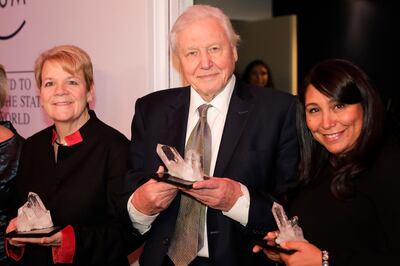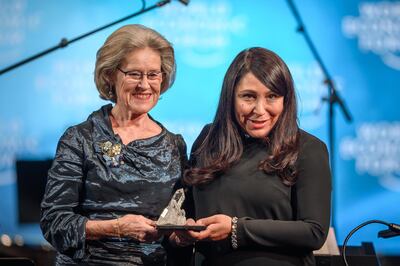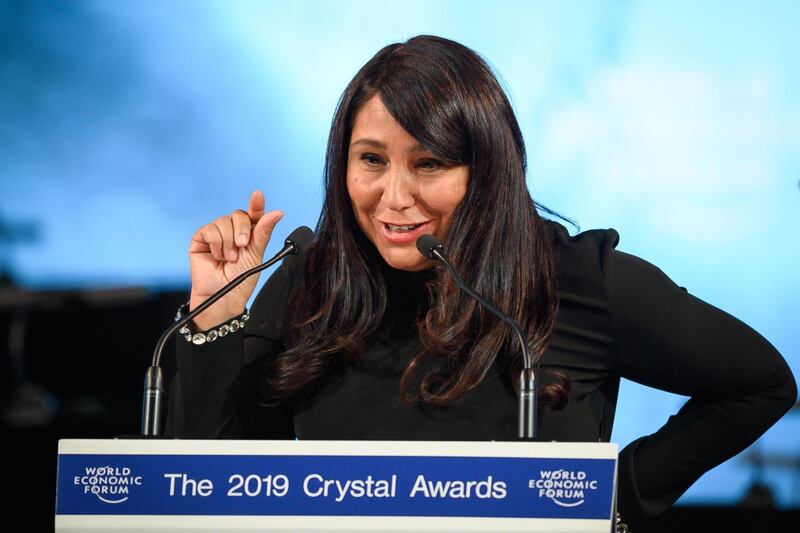Saudi Arabia's first female filmmaker said a change in Hollywood's relationship with women is not a fad, praising the progress of Arab women in film – and the region.
Haifaa Al Mansour was speaking at the World Economic Forum in Davos – on a panel entitled An Insight, An Ideawith Haifaa Al-Mansour – where the director was given the Crystal Award on Monday (January 21) in recognition of her leading cultural transformation in the Arab world.
She said that since the #MeToo movement began she has seen a change in the way she is treated in Hollywood.
But the Wadjda director also warned there still needs to be a lot more progress and that women need to support each other, particularly in the arts.
"If a male director makes one film aired at Sundance, his next job will most likely be a big budget, but a female director will need to have three films made before she achieves that level," she said, bemoaning the higher bar set for women in Hollywood.
"So there is always a sceptism of, 'Can a woman handle a big budget? Can a woman do it'?"

'Arab women are all victims'
While films directed by and starring women in lead roles are taken more seriously now, Al Mansour says Muslim women are still being depicted as victims in the scripts she's being sent.
"All the scripts I get about Muslims and Arab women are all victims and sad and things are happening to them," she said. "No – we're really sassy. We're very strong. Don't take us for granted."
However, Al Mansour also said she's receiving better scripts and getting higher-level meetings since the female-led #MeToo and Time's Up movements, which started in 2017.
"Usually they only meet with middle-aged white men, so now there is a chance for a more diverse director like me working in Hollywood."
Social media is a helping hand
With changing attitudes, evolving technology, too, has helped Arab women connect with each other, especially in Saudi Arabia where interactions between men and women are controlled.
"If society is segregated, it is not segregated online," Al Mansour commented. She praised women who start a business or express themselves on Instagram, and adds how Twitter has unearthed a new side of Saudi culture.
"One thing I find about the Saudi culture is they have a great sense of humour – we didn't know that before Twitter," she said, prompting ripples of laughter from the Davos audience.

Most importantly, she says, women need to support each other if we're to make strides in reaching true gender equality, both in Hollywood and in the Arab world.
"Once women understand how important it is to support other women and give them opportunities, I think that will give them a very drastic shift in the workplace," she said.
The making of Al Mansour
Al Mansour is a pioneering filmmaker in a country that only saw the return of cinemas after three decades of complete closure last year. She first made headlines in 2005 for a documentary short film, Women Without Shadows.
But it was her first feature BAFTA-nominated film, Wadjda, about a young Saudi girl on a mission to buy a bicycle, which was shot entirely in Saudi Arabia, that put the director on the global map and led to her recognition in Davos.
While the film is about a young girl striving against gender norms, Al Mansour said she also wanted to show the restrictions against men – portrayed through the eyes of the girl's father.
_______________
Read more:
[ 10 women who are shaping the Middle East cultural scene ]
[ Nadine Labaki is the first Lebanese female filmmaker to ever be nominated for an Oscar ]
[ Haifaa Al Mansour is returning to film in Saudi Arabia ]
_______________
World Economic Forum recognition
Her achievements were recognised this year by the World Economic Forum where she was given the Crystal Award in recognition for the leadership in cultural transformation in the Arab World.
Other winners were legendary British nature broadcaster Sir David Attenborough and symphony orchestra conductor Marin Alsop.
The Crystal Awards recognised those in arts and culture who have made an impact in the "spirit of Davos".
More strides for Arab women
This week, Lebanese filmmaker Nadine Labaki also made history by being the first Arab woman to be nominated in the best foreign language film category at the Oscars – a nomination Al Mansour described as "amazing".
Labaki was nominated for her moving refugee drama Capernaum, which has also received acclaim from the BAFTAs, Golden Globes and in Cannes.
Although many have bemoaned the fact that no women were nominated in the best director category at this year's Academy Awards, and no female-directed films were picked for the best picture category, either.






